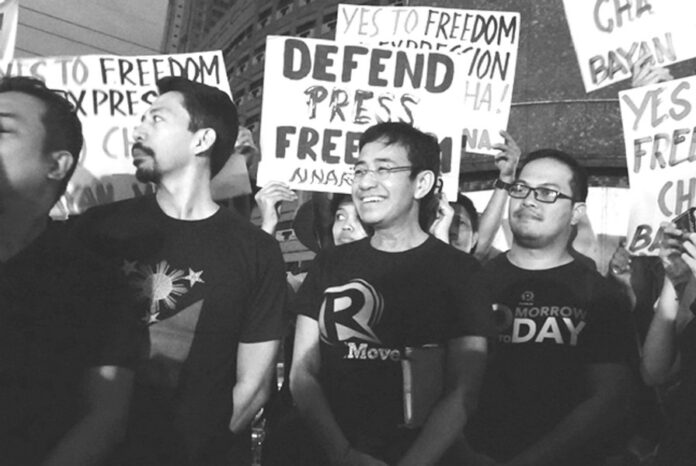It has been 33 years since the EDSA uprising when the Filipino people ousted the tyrant and dictator Marcos from Malacañang. In the Philippines, people from all walks of life, young people and those who marched those streets 33 years ago, gathered in their numbers with their banners at the EDSA shrine in Manila to declare in one loud voice: “Tayo ang EDSA, tayo ang pag-asa. Tayo ang EDSA, labanan ang diktadura.” We are EDSA, we are the hope. We are EDSA, fight the dictatorship.
Like many human rights activists and other Filipinos from various sectors of society, EDSA and the events leading up to that fateful day in February and its aftermath, remains a vivid lived experience, not a magazine article, a video clip or a chapter in a book. I am sure that there are many Filipinos here in Canada and abroad who remember the ouster of the dictator Marcos – they may not have been in the streets or in the aftermath of this upheaval – but they would remember and know the elation and confidence of the power of the people of having overthrown a despot.
Then and now, the systematic campaign to silence dissenters including human rights defenders, lawyers, social and political activists, critics, journalists and media people, through state violence, trumped up charges and human rights violations stares us in the face. It is already an international concern. The case of Maria Ressa of Rappler only made more visible the pattern of demonization, harassment, red-tagging which has also unleashed a pack of foul-mouthed online citizens and trolls whose actions and words would put our elders to shame. The vitriolic diatribes are not only “below the belt” but also offensive, hateful, and can only lead to intense hatred and blind, senseless violence. In other places, such actions would be considered hate crimes, but then we are talking about the Philippines, not Canada. If you don’t believe me, read the online posts of Duterte supporters calling for attacks against Maria Ressa and the Rappler staff, threats to hang and lynch and even rape Maria Ressa. https://www.rappler.com/nation/224115-duterte-supporters-call-for-attacks-newsroom-journalists-february-2019
These are calls to commit crimes in the vilest language and if we as ordinary people, as overseas Filipinos, think that this is nothing to be concerned about, then we have lost our soul, our dignity. As human beings. As Filipinos. This kind of evil behavior is now the new normal, as citizens and trolls ape the highest official in Malacanang.
The right to dissent is a crime in the Philippines. The right to speak and write the truth, to work for the indigenous peoples, workers and peasants, the right to use the basic human rights as enshrined in the many international conventions, even the Philippine Constitution threaten the existing order.
Let us not forget that the history of the Filipino people is the history of ordinary men and women who fought for rights, justice, and for national sovereignty against local and foreign oppression. At different periods in our history, these men and women were demonized, hunted down, arrested, exiled and executed. They were called derogatory names like filibusters, insurrecto, rebelde, subversibo, communists, ladron, bandido, by governments and ruling classes who were threatened and scared of them. And yet, years and many decades later, these very same men and women are hailed as heroes and they are the ones who tell us, our young people, that we come from a long line of courageous and freedom loving men and women.
With International Women’s Day coming up, many Filipinos think of Gabriela Silang, the General who led and fought alongside her army against the Spanish soldiers. When she was arrested, the Spaniards sentenced her and her men to die by hanging. And if that was not enough, the Spaniards hanged her last to force on her the agony of seeing each of her men die before her eyes.
Gabriela Silang surely has inspired Filipino women down the generations to fight tyranny, in whatever form, in whatever way. And Maria Ressa who wields her pen as her weapon to fight tyranny would make Gabriela proud.
Therefore, to remember EDSA is also to remember our people’s history when the Filipino people used their power, the power of the people, to fight against tyranny. To remember is also to take action against tyranny wherever we are!



